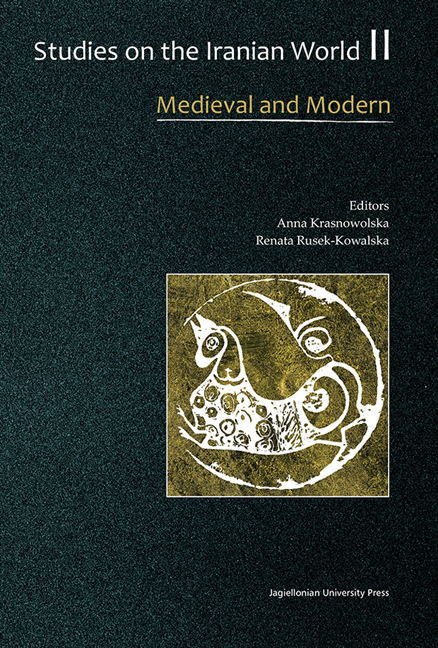Book contents
- Frontmatter
- Contents
- Foreword
- Linguistics
- Literature
- Religion
- History
- The Failure of the Constitutional Monarchy in Iran: The Socio- and Psycho-Genesis of Reza Khan's Rise to Power
- Concerning One Unpublished Persian Historical Document from Afshar Period
- Clash or Compromise? Mongol and Muslim Law in the Ilkhanate (1258–1335)
- New Insights on the Fiscal System of the Early Ilkhanids through the Analysis of al-Murshid fī al-Ḥisāb, an Unknown Accounting Manual
- Archaeological Survey of Kamar-e Marj Castle in Kermān Province
- Historians of their Time: Mongols, Mamluks and the Treatment of the Past
- Arts
- Social and Cultural Studies
Clash or Compromise? Mongol and Muslim Law in the Ilkhanate (1258–1335)
from History
Published online by Cambridge University Press: 12 January 2018
- Frontmatter
- Contents
- Foreword
- Linguistics
- Literature
- Religion
- History
- The Failure of the Constitutional Monarchy in Iran: The Socio- and Psycho-Genesis of Reza Khan's Rise to Power
- Concerning One Unpublished Persian Historical Document from Afshar Period
- Clash or Compromise? Mongol and Muslim Law in the Ilkhanate (1258–1335)
- New Insights on the Fiscal System of the Early Ilkhanids through the Analysis of al-Murshid fī al-Ḥisāb, an Unknown Accounting Manual
- Archaeological Survey of Kamar-e Marj Castle in Kermān Province
- Historians of their Time: Mongols, Mamluks and the Treatment of the Past
- Arts
- Social and Cultural Studies
Summary
SUMMARY
With the Mongol invasion of Persia and the founding of the Ilkhanate in 1258, the stage was set for the sometimes difficult encounter between Islamic and Mongol law, which has often been described as a ‘clash.’ This paper will look at factors which smoothed the encounter by allowing co-existence and compromise between Mongol and Islamic law. While many Mongols were willing to allow Muslims to practice their own law, Muslim objections to Mongol legal practices were also tempered by several factors, including the previous acceptance of ‘secular’ forms of trial such as the mazalim; the source of law being in religion rather than the ruler, which allowed Islamic legal practices to easily continue; and the possibility interpreting events in moral rather than strictly religious terms. Thus, the attitudes of both the conquerors and the conquered contributed to Mongol rule creating relatively small and painless ripples in the Persian legal landscape.
INTRODUCTION
When the Mongols invaded and came to rule Persia, they brought with them their own legal norms, but also had to confront the fact that in Persia there existed already a functioning legal system. How the Mongols reacted to this legal system, and how Muslims reacted to Mongol laws, is the subject of this paper.
The Mongol and Islamic legal systems were very different. Not only did they represent different cultures, they were also representative one of a sedentary way of life and the other of a nomadic way of life. The Muslims had a class of legal specialists and a voluminous literature surrounding the legal system; the Mongols initially had neither legal specialists nor writing, although they assiduously and even religiously respected certain norms and taboos, while serious disputes were more often than not solved by the aggrieved ‘taking the law into their own hands’ in vengeance.
Therefore it is not at all surprising that the encounter between Mongol and Muslim law is often described as a clash. Many authors simply assume the basic incompatibility of Islamic and Mongol law, and suggest that the influence of Mongol law faded with time. The idea that there existed a ‘Great Yasa’ i.e. codification of Mongol customary law to which the Mongols held strongly has reinforced the idea of the fundamental incompatibility of Mongol and Islamic law.
- Type
- Chapter
- Information
- Studies on the Iranian WorldMedieval and Modern, pp. 187 - 196Publisher: Jagiellonian University PressPrint publication year: 2015



